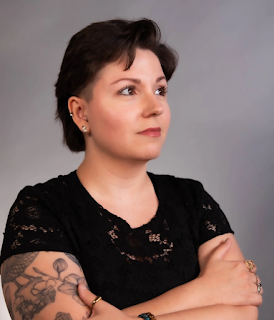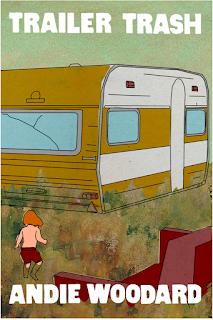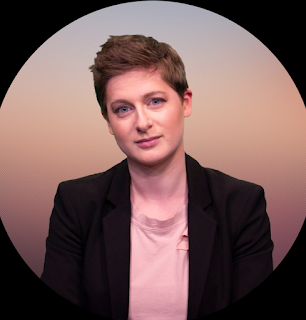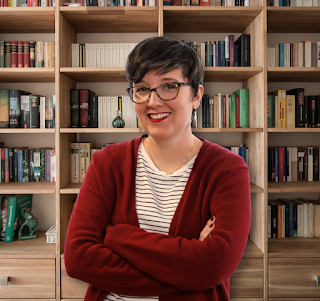It is my pleasure to welcome my writer friend (and fellow tea aficionado) Julie Bonner Williams and introduce her to you.
Julie writes across many genres: fiction, essay, non-fiction, and poetry. Publications that have featured her writing include Seventeen, MichiganBLUE Magazine, Grand Rapids Magazine, and The Grand Rapids Press. She has
taught writing at Grand Valley State University, Kendall College of Art and
Design/Ferris State University, and Grand Rapids Community College.
Julie lives
on the Michigan lakeshore, where she has amassed an absurd amount of legal pads
and Bic pens. Her interests include playing with her dogs, antiques, learning French, and growing organic lavender.
I'm grateful she agreed to chat with me and share her writing journey with you.
Ami: How long have you worked in the publishing industry? What are some of the positions you’ve held?
Julie Bonner Williams: This is a tough one to answer, because I’ve had such a variety of roles over a lot of years. In my own work being published, that began when I was seventeen. I submitted poems to Seventeen magazine and, over the course of a year or more, they accepted five of about eight I submitted. I was underage, so my mother had to sign my contracts. I made $15 per poem, which I thought was awesome at the time. I was, after all, making minimum wage ($3.35/hr) at my part-time retail job. So if we start here, I’ve been in publishing – with having my work published – since about 1982.
If we’re talking about being in the publishing industry in regard to publishing the works of others, while I was an adjunct English professor at Grand Rapids Community College, I was the English department advisor and writing contest organizer. At the time I was also teaching Writing for Publication and composition writing courses. Years later I worked as managing editor for an imprint of HarperCollins.
Ami: You've been involved in publishing from both sides of the editorial desk. What specific skills does a working writer need? How does one go about developing those skills?
Julie: What first popped into my mind with this question was, "A working writer needs a thick skin and tenacity."
Being a working writer comes with a lot of "no’s." Keep in mind both Ernest Hemingway and Stephen King accumulated dozens of them. King strung his on a huge nail at his desk. It’s discouraging. It’s sometimes disheartening, even defeating. I read recently that seeing “NO” as an acronym for “Next Opportunity!” is a positive way to think of the word.
The tenacity piece here is necessary to not simply give up as a result of getting rejections or -- sometimes worse -- getting no response at all.
Developing those skills is an individual thing. Some people are naturally able to let things roll off easier than others are. I feel the pain. Then I look for ‘uplifters’ – people who encourage me, quotes that inspire me to keep going, songs that boost my mood and have a ‘go get ‘em’ message. The paradox is sensitive people are often the ones in the arts, and we’re also the ones who are hurt easily.
Ami: What is your favorite part of the writing process?
Julie: Ha! To quote Dorothy Parker, “I hate writing, but I love having written!”
My favorite part of writing is after I’ve completed a piece, edited it a couple of times, and can sit back with a gleaming smile of satisfaction. It’s that moment when it all comes together. I also love research, specifically anything to do with history or hearing people’s stories.
Ami: What are some of your favorite projects that you’ve worked on? What made them so special?
Julie: I was a contributing writer for two magazines owned by Gemini Media in Grand Rapids (since sold to Hour Media in Troy, Michigan). I was given a coveted assignment to write an entire supplemental magazine featuring a world renowned architect and his work and lifestyle. I worked with one of the best photographers in West Michigan and the two of us created the publication.
I also loved having assignments I co-wrote with another writer or writers, each of us writing a portion of a large, multi-part feature. When you partner with talented people who are top in their game, it’s an amazing experience.
Ami: What subject area are you most interested in writing about? Why?
Julie: I love memoir. Love it.
I love hearing people’s stories. When I go to the dentist, knowing I have to sit there for 20 minutes with instruments in my mouth so I can’t talk, I tell the hygienist, “Tell me your life story.”
I did this just a week ago, and she started with, “I was born in Grand Rapids… then I went to dental school…” so of course I asked, “Did your mother come to the college to change your diapers? I think you skipped a few years there.”
We backed up a bit and I heard about the New Kids on the Block posters on her bedroom wall as a kid, and how she married her high school sweetheart.
It's cliché, but it’s true – fact is stranger than fiction. A lot of the great writers knew this. Hemingway and Fitzgerald wrote about people in their social circle and their lives. Truman Capote did the same – which cost him pretty much every friend he had. Come to think of it, that came full circle – he was a character in To Kill a Mockingbird, written by his childhood friend, Harper Lee. There’s a lot of good stuff in real life.
Ami: How do you choose which projects on which to focus your time?
Julie: One word: deadline.
I do well with accountability. If I have a deadline – and/or a contract and pending check – that accountability gets me moving.
I don’t know if all creatives are like this, but I can be a fickle writer. I’m in love with a project and as I’m working on it, it sparks some too-amazing-to-not-start-writing-right-now idea and *poof!* off I go to start in on that new one. So, deadline, accountability, and falling in love in the moment.
Ami: What advice would you give to someone who wants to write for a living?
Julie: I'm going to address this one in stages:
A. Writing “for a Living”:
If the person wants to support him/herself solely on writing (and there’s no second income or sources of financial support), my advice is to find more than one stream of writing income. The kind of money needed to support oneself is going to come from gigs other than trying to write and publish a novel that may or may not be published and may or may not sell copies.
A lot of writers teach writing (or literature) as K-12 teachers or college professors (part-time or full-time). There are other options that can be more lucrative and allow more freedom, such as teaching writing workshops.
B. Be Open to Learning from Others:
After years of teaching writing in various forms (Creative Writing, Writing for Publication, Journalism, Composition Writing, Business Writing) and taking writing courses years ago, I offer this: check your ego at the door. Remember to remain humble. No one likes a prima donna.
I have been stymied by the outright arrogance of students in college writing courses, my own and others. I once took a course taught by a successful Hollywood screenplay writer. A student, maybe 18 or 19 years old, argued rudely with the professor that, “If it don’t rhyme, it ain’t poetry! Poetry has to rhyme!”
The professor tolerated it to a point, but the guy wouldn’t stop, and finally, through gritted teeth, the prof half turned from the eraser board, and stated loudly and bluntly: ”No. It doesn’t.”
Not long ago, while teaching a writing course, I asked the students to write their introduction paragraphs, then to write their conclusion paragraphs immediately after. A student in the class didn’t want to, insisting loudly, “I don’t write like that!” -- It’s a class. You’re here to try new things. You don’t have to adopt it for the rest of your life. But you do have to open your mind and try it now.
C. Get That You Can Always Glean Something from a Writing Book or Course
I used to have this "I know how to write" thing going on. The more I read great writing books and listened to successful writers on YouTube and other sites, the more I realized there’s always a new perspective, new ideas, and new approaches.
Sometimes I hit a chapter or book and yeah, I already know what they’re talking about. But then I may flip forward a chapter or so, and sometimes find a cool quote or insight that’s useful.
Never quit learning!











